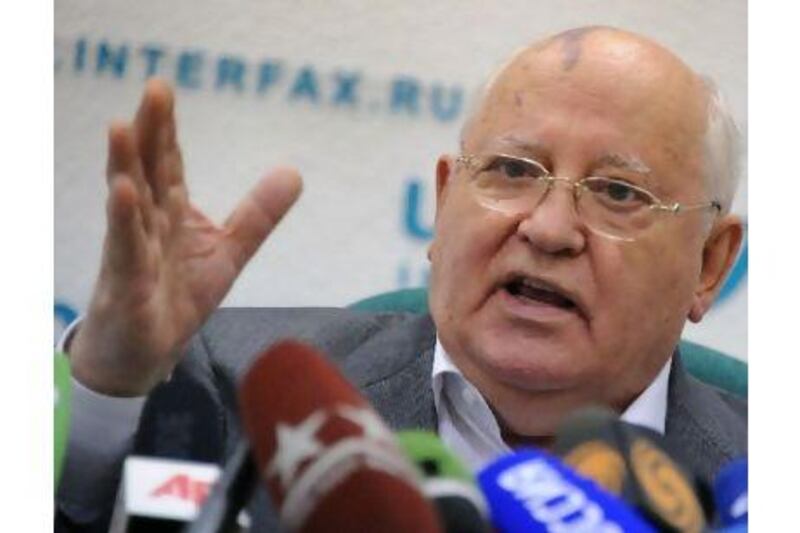MOSCOW // The former Soviet leader Mikhail Gorbachev criticised the government yesterday for taking Russia backward and said that the nation needed free elections and fresh leadership.
He was speaking ahead of the 20th anniversary of the August 19, 1991, hardline coup that briefly ousted him and precipitated the collapse of the Soviet Union.
Mr Gorbachev, who turned 80 in March and underwent spinal surgery in April, looked strong and spoke energetically during a news conference that lasted more than an hour.
Mr Gorbachev criticised the United Russia party led by Prime Minister Vladimir Putin, which he described as a bad copy of the Soviet Communist Party.
He said Russia needed to restore direct elections of governors and of individual seats in parliament, which were abolished during Mr Putin's presidency.
"Honest elections are needed: single-ballot elections, elections of governors," Mr Gorbachev said. "People must have a feeling that something depends on them."
He dismissed the Popular Front, an umbrella group of public organisations, professional associations and unions created with Mr Putin's blessing.
"They invent some unnecessary groups, some fronts," Mr Gorbachev said, adding that government spin doctors might just as well invent something like "10 Putin Strikes" - a sardonic reference to "10 Stalin Strikes", a term used by Soviet propaganda to describe the Red Army's offensives during the Second World War.
The front's creation has been seen as an attempt by Mr Putin to strengthen his support base ahead of parliamentary elections in December and a presidential vote in March.
Mr Putin, who shifted into the prime minister's job in 2008 because of a two-term constitutional limit, is widely expected to reclaim the presidency.
Mr Gorbachev avoided personal criticism of Mr Putin, saying that he deserved credit for stabilising the country after the economic meltdown and chaos of the first post-Soviet decade. A the same time, he harshly criticised the system of government created by Mr Putin, saying that manipulations of elections had pushed the country back.
"There must be a change in the upper layer of government," he said.
Mr Gorbachev has long been critical of Mr Putin's policies, warning that the lack of political competition, flawed elections and rampant corruption have stymied Russia's development.
Popular in the West for the role he played in ending the Cold War, Mr Gorbachev is disliked by many at home for the collapse of the Soviet Union and the years of turmoil that followed it.
He insisted yesterday that the USSR could have been preserved through gradual democratic changes and acknowledged making mistakes that led to the August 1991 coup, which dealt a deadly blow to the Soviet Union.
Mr Gorbachev admitted that he had placed excessive trust in some of his aides and allies and was too slow in reforming the Communist Party, where the old guard was fiercely resisting reforms. He also recognised that ill-conceived economic reforms resulted in empty shelves, fuelling public discontent.
Mr Gorbachev insisted that his main focus at the time was to avoid bloodshed. "There could have been a civil war," he said. "A civil war in a country rigged with nuclear weapons."
He said that he still considered himself a happy person.
"I found myself in the epicentre of major events, where I was making decisions that led to positive changes," he said.






